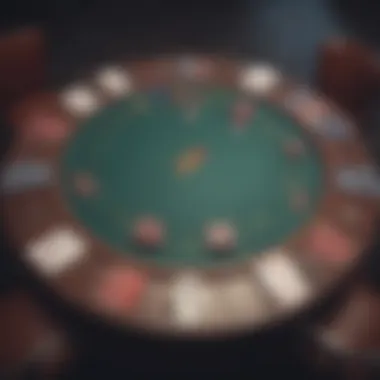Mastering the Strategies of Seven Card Poker


Intro
Seven Card Poker is more than just a card game; it’s a battleground where strategy and psychology intertwine. Originating from the rich history of poker games, its complexity lies not only in the rules and rankings but also in how players interact with each other at the table. It has piqued the interest of many, from casual players to seasoned professionals, making it essential for anyone in the gambling realm to understand its intricacies.
In this article, we will dive deep into the gameplay strategies, offering tips for novices as well as advanced techniques that seasoned players can utilize to maximize their winning potential. We will also explore industry insights—including trends and technological impacts that shape the casino landscape. Whether you're sitting at a home game or a high-stakes table, having a solid grasp of Seven Card Poker can significantly enhance your approach to the game.
Intro to Seven Card Poker
Seven Card Poker stands as a formidable titan in the realm of card games, embodying an intricate interplay between strategy and psychology. Not only does it serve as a compelling pastime for enthusiasts, but it also offers a robust platform for professional gamblers seeking to hone their skills. Understanding the foundations of this game is paramount for anyone aspiring to excel within the competitive environment of poker.
In this section, we delve into its mysterious past and elaborate on how it has shape-shifted through time. The historical backdrop provides context, while the evolution of its gameplay highlights the adaptations that have kept it relevant and engaging for decades.
Moreover, grasping the nuances of Seven Card Poker cultivates a deeper appreciation for its strategic layers. Whether one is figuring out the odds or attempting to read the nuances of an opponent's gameplay, a robust understanding of its fundamentals equips players for success in both casual settings and high-stakes championship rounds.
The significance of this section cannot be overstated—it's the launching point into the mindset needed to tackle the complex strategic web of Seven Card Poker. As we navigate through the game's history and evolution, readers will discover the lasting appeal of this classic card game.
Historical Background
As with many games that have stood the test of time, the history of Seven Card Poker is as rich as it is enigmatic. It is rooted in the broader lineage of poker, likely tracing back to the early 19th century in North America. The initial forms of poker, using a 20-card deck, laid the groundwork that would eventually pave the way for the seven-card variant.
Considered a blend of social interaction and skill, poker was often played in saloons and taverns, evolving from simple betting games into a sophisticated gamble involving bluff, strategy, and unmatched psychological warfare.
The expansion of the game happened alongside the westward expansion of the United States. As poker spread across the states, its rules diversified, leading to the variation we know today. Seven Card Stud became particularly sought after due to its complexity and the demand for strategic depth. During the mid-20th century, tournament play further popularized it, introducing various formats that captivated players worldwide.
Only the most dedicated would engage in the long sessions required to truly master this game, where each card could hold a wealth of implication for a player's potential outcome. This slice of poker history not only illustrates its rich tapestry but also sets the stage for understanding its enduring popularity.
The Evolution of Poker Games
To appreciate where Seven Card Poker fits within the entire poker ecosystem, it is essential to recognize the evolution of poker itself over the decades. The game has undergone significant transformations, affecting gameplay, structure, and even the strategic considerations essential for success.
Initially, poker was relatively straightforward; players used a smaller deck and fewer hands. Gradually, variants emerged: Texas Hold'em, Omaha, and others introduced new elements of strategy and excitement. Seven Card Poker carved a niche by integrating elements from its predecessors while adapting to player preferences and competitive standards.
Today, Seven Card Poker is often seen as a 'thinking man’s game,' demanding not only a good hand but a well-crafted strategy that examines the mechanics of betting, bluffing, and emotional control. Various variations continue to permeate the poker landscape, ensuring that even as it evolves, the essence of Seven Card remains intact—a blend of luck and informed decision-making crucial for asserting dominance in the game.
Ultimately, together with the historical context, the evolution of poker manifests a compelling narrative about Seven Card Poker's journey and its relevance in the contemporary gaming world.
Understanding the Gameplay
Understanding the gameplay of Seven Card Poker is akin to laying down the foundation before constructing a solid building. Not only does it encompass the core mechanics of how the game unfolds, but it also feeds into a player’s overall strategic grasp. Familiarity with the game is what separates seasoned players from novices, allowing them to navigate the fluctuating tides of chance and strategy.
Mastering the gameplay enhances one’s ability to adapt, whether that means switching tactics or assessing an opponent’s behavior. Players equipped with solid gameplay knowledge can more consistently identify profitable opportunities, making decisions that are not solely based on luck.
In this segment, we delve into the key components that form the backbone of Seven Card Poker's gameplay. Let’s break it down further:
Basic Rules Overview
The rules of Seven Card Poker are straightforward, yet they offer layers of complexity that can be exploited for strategic play. Players begin the game with cards dealt face down, usually involving a standard 52-card deck. Each player receives a combination of face-down cards and community cards throughout the rounds, enabling various decisions based on the hand’s potential.
Here are some fundamental rules:
- Each player is dealt seven cards total: two private cards and five community cards.
- The game consists of multiple betting rounds: typically including pre-flop, post-flop, turn, and river.
- Players aim to create the best five-card hand using any combination of their two cards and the five community cards.
The betting structure varies, with players allowed to check, call, raise, or fold based on their hand’s strength or bluffing intent. If everyone folds, the last player remaining wins the pot without ever having to reveal their hand.
Understanding these rules is crucial, as it sets the stage for deeper strategic insights down the line.
Essential Terminology
To truly grasp the nuances of Seven Card Poker, one must be familiar with its specific vocabulary. Knowing the terminology not only enhances comprehension but also allows for effective communication, especially in competitive settings.
Some key terms include:
- Bluff: Deceiving opponents into believing one has a stronger hand than they actually do.
- Flop: The first three community cards revealed after the initial betting round.
- Turn: The fourth community card dealt following the flop.
- River: The final community card shown after the turn.
- Pot: The total sum of money bet by players in a particular hand.
- Showdown: The phase where remaining players reveal their cards and determine the winner.


By familiarizing oneself with these terms, players gain a clearer perspective not just on gameplay, but on the intricacies of strategic play that is foundational to achieving success in Seven Card Poker.
Game Structure and Dynamics
Understanding the game structure and dynamics of Seven Card Poker is crucial for grasping how this intricate card game unfolds. The way the game is set up, the flow of betting rounds, and the showdown procedure play significant roles in determining the outcomes of each session. Each of these elements serves to enhance the experience, influencing both strategy and decision-making.
In essence, knowing the mechanics of the game is akin to having a roadmap; it helps players navigate through the various stages with confidence and skill.
Table Setup
The table setup in Seven Card Poker has its own flavor that can vary, but it generally includes a few essential components: the dealer button, betting circles, and player positions. Each player sits around a designated table, and they receive cards that will eventually lead to their potential winning hands.
- Dealer Button: This small disk indicates the dealer position and moves clockwise after each hand. This position is significant, as it often allows for strategic advantages in both betting and decision-making.
- Betting Circles: These are specifically designated areas where players place their bets. These spaces help maintain order during the game and define the limits of action.
- Player Positions: The seating arrangement matters—a lot. Players to the left of the dealer button are first to act in the early rounds, and their choices can influence the dynamics at the table.
Every game starts with the players posting their blind bets. The small blind and big blind, different for each game, set the stage for the initial action. Notably, this layout establishes a rhythm to the game, creating patterns that players can learn to exploit.
Betting Rounds Explained
Betting rounds are where much of the tactical magic happens in Seven Card Poker. But, it’s not just about throwing chips into the pot; it's a dance of psychology and strategy.
- Pre-Flop: After the hole cards are dealt, players evaluate their hand strength and decide whether to call, raise, or fold. This round sets the tone.
- Post-Flop: When the community cards are revealed, the dynamics shift. Players reconsider the potential of their hands and act based on the changed landscape. Here, the important decisions are made that could lead to large pots or lead to elimination.
- Turn and River: These are the final community cards that further refine hand possibilities. Players must carefully analyze both their own holdings and the potential hands their opponents could be building.
- Action Flow: The ability to read players during these rounds can sway outcomes significantly. For instance, identifying when an opponent is bluffing can swing the game in a player’s favor. So, being attentive to betting patterns is essential.
Showdown Procedure
The showdown procedure is the grand finale of any Seven Card Poker hand. It's crucial as it determines who wins the pot. Once all betting rounds conclude, the remaining players reveal their hands in the order of betting or by agreement.
Here are key aspects of the showdown:
- Revealing Cards: Players must show their best five-card hand from the seven cards available. Tactics come into play here, as players want to display strength.
- Comparing Hands: The player with the highest-ranking hand takes the pot, and this is a moment where emotions can run high, often bearing witness to the ups and downs of gaming.
- Winning the Pot: The winner takes not just the chips but also the psychological advantage, carrying the tone of victory into the next hand.
In summary, the structured flow of Seven Card Poker—from the table setup through the critical betting rounds to the showdown—creates a layered experience that requires a blend of strategy and psychological acumen. Each stage serves as a stepping stone, integrating into a dynamic interplay that keeps both players and spectators on edge.
Hand Rankings in Seven Card Poker
Prelude to Hand Rankings
Understanding the intricacies of hand rankings is crucial for any player venturing into Seven Card Poker. Hand rankings essentially determine who wins in a showdown after the bets have been placed and the community cards revealed. They serve as the backbone of strategic planning in the game, shaping a player's betting patterns, bluff attempts, and overall gameplay decisions. For newcomers and seasoned players alike, grasping the nuances of hand rankings can make the difference between clinching a victory or walking away empty-handed. Knowing that a straight beats a three of a kind, or that a full house triumphs over a flush, provides players with the knowledge to assess their hands judiciously, and to gauge the potential strength of opponents’ hands as the game unfolds.
From High Card to Royal Flush
Hand rankings in Seven Card Poker follow a specific hierarchy, starting from the lowest hand, which is a High Card, and escalating to the glorious Royal Flush. Here’s a brief outline of the rankings:
- High Card: If no player holds any combination, the hand’s highest card is considered.
- One Pair: Two cards of the same rank.
- Two Pair: Two different pairs.
- Three of a Kind: Three cards of the same rank.
- Straight: Five consecutive cards of different suits.
- Flush: Five cards of the same suit, not in sequence.
- Full House: A three of a kind combined with a pair.
- Four of a Kind: Four cards of the same rank.
- Straight Flush: Five consecutive cards of the same suit.
- Royal Flush: The highest straight flush (10, J, Q, K, A of the same suit).
Understanding these rankings can empower players to strategically decide when to bet or fold. They must also remember the community cards can significantly alter the potential value of their hands as rounds progress. Therefore, players should be vigilant and adaptable, as the dynamic nature of the game means the strength of hands can shift at any moment.
Common Misconceptions
Despite the straightforward nature of hand rankings, several misconceptions can lead players astray. Here are a few common ones that warrant clarification:
- Misunderstanding Straight and Flush: Some novice players struggle to recognize the distinction between straights and flushes. A straight comprises sequential cards, and suits do not matter. In contrast, a flush consists of cards sharing the same suit, regardless of order. This distinction can change the outcome of a hand drastically.
- Overrating Low Pairs: Many players think that holding a low pair guarantees a strong hand. While pairs can be valuable, they can be outmatched by hands like two-pair or straight draws. A cautious approach is always prudent.
- Bluffing with Weak Hands: Players sometimes overestimate the power of a weak hand during a bluff. A well-timed bluff is effective, but doing so when holding visibly inferior cards often results in a quick loss.
Understanding these misconceptions can save players from making crucial errors and enhance their overall gameplay experience. With a solid grip on hand rankings, coupled with an awareness of these misunderstandings, players can better navigate the complex landscape of Seven Card Poker.
Strategic Approaches to Play
The capacity to craft a solid strategy in Seven Card Poker is pivotal for discerning players aiming to enhance their performance at the tables. Understanding and adapting one’s strategy not only brings about a more enjoyable experience but often elevates the chances of success. A foolproof approach can make the difference between walking away with a handsome pot or, unfortunately, nursing feelings of regret. Let’s dive into three key elements: Pre-Flop Strategy, Post-Flop Decision Making, and Reading Opponents.
Pre-Flop Strategy
Pre-Flop Strategy forms the cornerstone of effective gameplay in Seven Card Poker. Taking time to evaluate one’s hand before the community cards appear is crucial. Here are a few core considerations:
- Starting Hand Selection: Knowing which hands to play is imperative. Strong starting hands such as a pair of Aces or Kings can set the tone for the remainder of the hand.
- Position at the Table: This is where you sit in relation to the dealer. Being in a late position can provide a tactical advantage, allowing you to observe the actions of others before making a decision.
- Bet Sizing: Determining the right size of your bet can be the key. A small initial bet might lure in more players, while a larger bet can sometimes scare them away, especially from a strong starting hand.


Establishing a pre-flop strategy helps build a framework for making informed decisions later in the game.
Post-Flop Decision Making
Once the community cards hit the table, the dynamics of the game shift rather significantly. The knowledge of the community cards, combined with your hole cards, directs your next moves.
- Evaluating the Board: Conduct a quick assessment of the community cards. This involves considering potential straights, flushes, or pairs. It also gives insights into how your opponents might perceive their odds.
- Adjusting Your Strategy: Once you understand the board’s dynamics, be ready to adapt. If you were previously aggressive pre-flop, but the community cards suggest a possible straight, it might be time to play more conservatively.
- Pot Odds: Evaluate whether the odds of completing your hand justify the call needed in the pot. If the pot offers good odds, it might be worthwhile to stay in.
Emphasizing a sound post-flop strategy can lead you to capitalize on the opportunities presented by the flop, turn, and river.
Reading Opponents
Understanding human behavior is an art form at the poker table. Reading opponents involves keen observational skills and psychological insights. It isn’t just about the cards they play but also about the subtle cues they give off.
- Physical Tells: Look for movements that might indicate strength or weakness. For instance, a player who suddenly becomes very still might be holding a strong hand, while fidgeting can suggest nervousness.
- Betting Patterns: A player’s betting frequency and size can provide substantial clues. For example, frequent raises from a particularly cautious player could indicate they have a strong hand.
- Talk at the Table: Sometimes, what players say can reveal more than their cards. A casual joke made just before a significant bet can hint that they might not be as confident as they seem.
Reading opponents not only bolsters your overall strategy but also adds an enjoyable social dimension to the game, as you engage your mind in nuances beyond just the cards.
Mastery in Seven Card Poker involves not just understanding the rules, but also refining strategic approaches and reading fellow players.
Psychology of Seven Card Poker
The realm of Seven Card Poker isn't merely about the cards you hold or the bets you place; it's a battle of wits and nerves. The psychological aspect of the game plays a pivotal role, influencing decisions and ultimately affecting outcomes at the table. Understanding this psychology not only heightens a player’s game but also nurtures an environment where strategy and emotion intertwine intricately. Every action at the poker table leans heavily on the mind—both yours and that of your adversaries.
Mental Preparation Insights
Before one even sits down to play, it’s crucial to enter the game's arena with the right mental toolkit. Mental preparation for poker transcends just strategy; it involves mentally conditioning oneself to face various scenarios that may arise during play.
Players should take time to visualize potential outcomes or imagine specific strategies they might deploy based on their hand. Some find it helpful to meditate or practice visualization techniques to forge a calm and focused mindset. This preparation can diminish anxiety and allow for clearer thinking when the cards are dealt.
Consider practicing scenarios like what-if situations: What if my opponent raises significantly? How should I respond? Harnessing these thoughts can mean the difference between a hasty decision and a well-thought-out play. Mental conditioning not only aids your strategy but fortifies your resilience when things don’t go your way.
The Impact of Emotion on Gameplay
Emotions can be your best ally or the worst foe in Seven Card Poker. The subtle dance of emotions often dictates gameplay in more ways than one. Take, for example, the all-too-common experience of a player who "tilts" after a loss. This emotional state often leads to poor decision making, as frustration and anger cloud judgment.
It's critical to remain level-headed and recognize when emotions sway your decisions. The ability to separate one’s emotional state from gameplay not only enhances focus but also fosters an atmosphere of controlled aggression when needed.
Here are some emotional pitfalls players often encounter:
- Tilt: Playing erratically after a bad beat, leading to losses.
- Overconfidence: After winning, players may take unreasonable risks, thinking luck is on their side.
- Fear: Worrying too much about what others may think can also hinder decision-making.
The psychology involved in poker demands a constant self-check. > "The mind is the battlefield; it is where triumphs and defeats occur."
To thrive in a game that predicates itself upon psychological warfare, players should harness emotional intelligence. Self-awareness leads to better choices and ultimately, a more successful poker experience. Shaping a healthy emotional landscape while maintaining an agile mental approach allows players to rise above their competition and truly master the art of Seven Card Poker.
Common Mistakes and Pitfalls
In the world of Seven Card Poker, even the most seasoned players can trip over their own strategies, often resulting in costly errors. Understanding common mistakes and pitfalls not only sharpens one's skills but also enhances overall enjoyment of the game. Whether you’re a novice or a veteran, recognizing these traps is crucial, since they can make the difference between winning and walking away disappointed.
Overvaluing Hands
One glaring mistake many players make is overvaluing their hands. It’s easy to get carried away when holding what feels like a strong hand, but in the context of the game, perception can be deceiving. For instance, you might be holding a pair of aces, which seems robust at first glance. However, evaluating the community cards is essential. If the board shows potentially stronger combinations, like a flush or straight, your aces might not hold up.
Players often fall victim to this by betting heavily on their pairs or top cards without assessing the game state thoroughly. A poker pro recognizes the difference between a hand that genuinely has strength and one that merely looks good on paper. To counteract this tendency, consider applying the following strategies:
- Reassess after each round: Pay attention to how the board develops. Does your hand remain strong against possible combinations from your opponents?
- Avoid emotional attachment: Just because you have pocket kings doesn't mean you have the best hand. Stay objective.
- Learn from the losses: Each mistake is a lesson. Reflect on hands where you overstepped and understand why.
Variations of Seven Card Poker
Understanding the variations of Seven Card Poker is essential not just for grasping the game's depth, but also for enhancing your overall gameplay experience. Different versions bring unique rules, strategies, and nuances. This diversity allows players to find their preferred style and adapt their strategies based on the variant they choose.
Some variants are played in a more casual setting, providing friendly competition among family or friends. Others push the strategic boundaries, challenging even seasoned professionals. Here's a closer look at significant aspects of these variations.


Popular Variants Overview
When it comes to Seven Card Poker, several popular variations stand out, each with its unique flavor. Some of these include:
- Seven Card Stud: One of the oldest forms, it doesn’t use community cards. Players receive three cards face down and four face up throughout the rounds. The strategy here often revolves around reading opponents based on their visible cards.
- Texas Hold’em: Perhaps the most recognized variant today, it has players receiving two private cards, with five community cards dealt over multiple rounds. This game finds a balance between strategy and chance, making it a staple in tournaments and casinos.
- Omaha Hi-Lo: Similar to Texas Hold�’em but with a twist; players receive four hole cards, and they must use two of them along with three community cards to form their hands. The game’s high-low split adds a layer of complexity, demanding more from players in terms of hand evaluation and strategy.
- Razz: This variant turns the traditional hand rankings on its head by focusing on creating the lowest possible hand. Players must adapt their strategies to identify low cards and discard higher ones, making it a unique yet challenging form of play.
Each of these variants not only shifts the focus of gameplay but also brings different strategies into play. Players often find that their skills in one variant may not entirely transfer to another, necessitating a whole new approach.
Differences in Rules and Gameplay
Each version comes with its own set of rules. Understanding these differences is critical for players wanting to switch between variants or simply broaden their poker repertoire.
- Card Dealing: In Seven Card Stud, each player receives a mix of face-up and face-down cards, while in Texas Hold'em, community cards are a significant focus. This difference affects how players assess their chances and calculate their odds.
- Betting Structures: Some games may utilize fixed limits, pot limits, or no-limits, changing how players strategize their betting. For instance, in a no-limit game, bluffing and aggressive play can be more rewarding, allowing for larger pots.
- Win Conditions: The hand rankings and criteria for winning can vary significantly between games, especially with Omaha Hi-Lo where players can aim for either the low or high pot. This demands a different mindset and understanding of the game.
- Player Interaction: Variants like Razz encourage a more defensive approach in reading opponents, as the aim is to form the lowest hand. Understanding how and when to bluff becomes pivotal.
In summary, knowing the variations of Seven Card Poker enriches the player's arsenal. Each variant offers distinct mechanisms and demands that test various skills. Familiarity with these forms can turn a good player into a great one, equipping them to tackle a wide array of poker situations with confidence and savvy.
"Poker is a game of skill and strategy, but the variations turn it into a chess match waiting to unfold."
These insights lay the groundwork for players to appreciate the nuances and complexities within the realm of Seven Card Poker.
Resources for Improvement
In the pursuit of mastering Seven Card Poker, the importance of continuous improvement cannot be overstated. Whether you are a novice eager to learn or a seasoned player aiming to refine your skills, tapping into a variety of resources can make a world of difference. This segment will delve into how investing time in learning through books, literature, and online tools can elevate your game. By exploring structured avenues for improvement, players can discover nuanced strategies, understand betting behaviors, and ultimately enhance their overall performance at the table.
Books and Literature
Books have been the backbone of poker education for decades. They not only present theoretical aspects of the game but also provide insights into the psychological and strategic elements that enrich your gameplay. Some notable titles include:
- "The Theory of Poker" by David Sklansky: A classic text that dives deep into the mathematics and strategy of poker, dissecting the core concepts and strategies that govern winning play.
- "Harrington on Hold'em" by Dan Harrington: This book focuses particularly on tournament play, offering stellar advice on hand selection, positioning, and mental aspects of the game.
- "Super System" by Doyle Brunson: An essential read for anyone looking to understand various forms of poker, including valuable insights directly from one of the game's legends.
Reading these works can provide a context for understanding the complex strategies used by top players. Moreover, they can build a solid foundation for sound judgment and decision-making at the table. It’s crucial to approach these texts not merely as instruction manuals but as a means to cultivate a deeper appreciation for the dynamics at play.
Online Tools and Simulations
In addition to literature, the digital age has ushered in a plethora of online tools and simulations that augment a player's learning experience. These resources allow for practical application of concepts learned from books while fostering skills in a risk-free environment. Here’s what to look for in effective online platforms:
- Poker Training Software: Platforms such as GTO Wizard or PokerSnowie enable players to practice and analyze their games. These tools provide invaluable data on various scenarios, allowing for adjustment of strategies based on statistical insights.
- Strategy Forums: Websites like Reddit and specialized poker forums are gold mines for community-driven discussion. Engaging in these spaces allows for sharing knowledge, discussing strategies, and receiving feedback on one’s playing style.
- Simulation Games: Apps like Zynga Poker or Doyle's Room let players simulate real-life game conditions. Experiencing scenarios in a simulated setting can bolster decision-making skills and aid in developing an intuitive grasp of betting patterns.
By utilizing these online tools, players can continuously test their understanding against varied opponents, hone their strategies, and even explore new variants of the game without high stakes. The combination of structured learning through books and dynamic practice via online resources lays a solid groundwork for poker success.
"Success in poker isn’t just about the cards you hold, but the knowledge you possess and how you apply it on the felt."
In summary, harnessing the power of books and online resources can serve as a pivotal step in your journey to becoming an adept Seven Card Poker player. Dedicating time to learning not only enriches your understanding but also prepares you mentally for the realities of high-stakes games.
Closure and Final Thoughts
Seven Card Poker stands as more than just a game of luck. It is a delicate balance of strategy, psychology, and skill—a space where analytical thinkers thrive. This article has taken a comprehensive dive into various aspects that define the complexity of this game, from its rich historical roots to the nuanced strategies that savvy players deploy.
Understanding the game involves grasping the rules and structure, but truly excelling requires a deep engagement with the psychological elements at play. Each decision made at that felt-covered table has ramifications, both for one’s own stack and for fellow competitors.
Players must remember that every hand is a new opportunity, not just for monetary gain but also for personal growth and mastery over the game's intricacies. This pursuit should not be seen as an end goal but rather as a continuous journey—one that invites learning and revisiting foundational principles.
"In poker, as in life, you often need to assess risks while being mindful of both your position and the environment around you."
As you reflect on the information presented, consider how it all ties back to your own experiences and strategies. Every lesson learned and every mistake made is a stepping stone toward improvement. The essence of Seven Card Poker lies in its complexity—embracing this complexity is key to navigating the challenges and triumphs within.
Recap of Key Points
To summarize:
- Historical Context: The evolution of poker has shaped the modern gameplay we know today.
- Gameplay Mechanics: Knowing the rules and hand rankings is crucial, but utilizing strategic nuances elevates your game.
- Psychological Aspects: Emotional control and reading opponents can significantly influence the game.
- Common Pitfalls: Awareness of mistakes like overvaluing hands and neglecting position is vital for growth.
- Continuous Learning: The landscape of poker is ever-changing, encouraging ongoing education and adaptation.
Encouragement for Continuous Learning
The journey of mastering Seven Card Poker does not end with understanding the rules and strategies; it is just the beginning. The beauty of this game lies in its adaptability. As you become more familiar with its intricacies, explore variations to broaden your skill set further. Engaging with online platforms and communities can provide fresh insights and strategies that keep your game sharp.
Consider diving into forums on Reddit, or connect with like-minded players on Facebook. Each interaction can spark a new idea or strategy that could be the difference between winning and losing your next hand. Remember to embrace both victories and defeats as teachers in this comprehensive learning process.
By maintaining a curious mindset and actively seeking improvement, you can elevate not only your gameplay but also your appreciation for the dynamics of Seven Card Poker.
Engage with literature, simulations, and even coaching, as accessible tools exist to enhance your experience. This adventure in Seven Card Poker promises to be rewarding, so keep your mind open and your strategies evolving.







